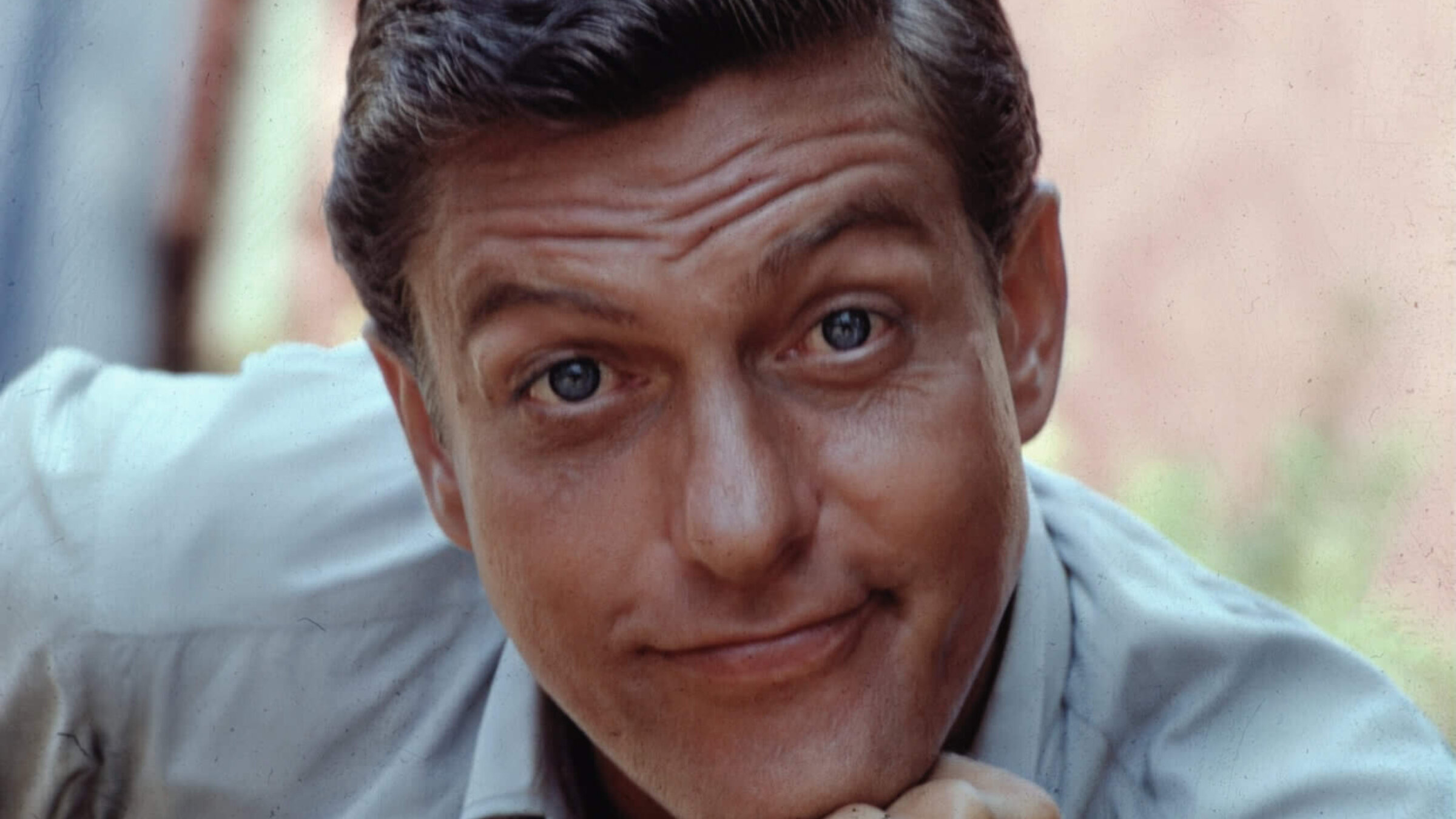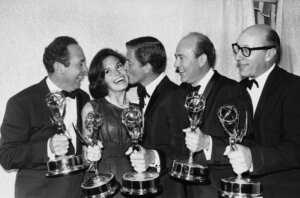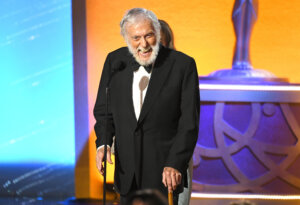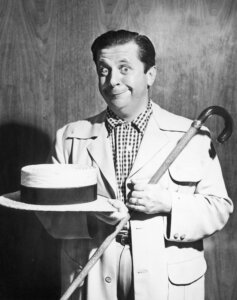The secret Jewish history of Dick Van Dyke
The veteran comic actor’s eponymous TV show was the brainchild of Carl Reiner and bears a passing resemblance to ‘Seinfeld’

Dick Van Dyke, 1964. Photo by Getty Images
Was The Dick Van Dyke Show a precursor of Seinfeld?
And why am I wondering about that now, decades after both TV comedy shows aired their final episodes?
In case you haven’t heard, Dick Van Dyke just added another trophy to his bedroom-sized closet of awards he has garnered over the course of his 70-plus year career in radio, on TV, on stage, and in film, including Golden Globes, Tonys, Emmys, and numerous lifetime achievement awards. But Van Dyke isn’t one to rest on his laurels — he just received the award for Outstanding Guest Performer in a Drama Series at the 51st Daytime Emmy Awards, for his spot on the venerable TV soap opera, Days of Our Lives. At 98 years old — or as he has been calling himself in recent days, “just five months from 99” — this easily makes Van Dyke the oldest person ever to win a Daytime Emmy.
But why does this leave me thinking of Seinfeld?

Van Dyke is best known for his lead role in the movie musical Mary Poppins and as the lead character in The Dick Van Dyke Show, which aired on the CBS-TV network from 1961 through 1966. The show’s title was something of a joke: when the program made its debut, few people — other than fans of his Tony Award-winning stint in the title role in the 1960 Broadway musical Bye Bye Birdie — knew who Dick Van Dyke was. To add to the enigma, Van Dyke’s character in his eponymous TV show wasn’t named Dick Van Dyke, but, rather, Rob Petrie, whose onscreen wife, Laura Petrie, was played by a then-unknown actress named Mary Tyler Moore.
The show was the creation of the Bronx-born TV writer and comic mastermind Carl Reiner — whose parents were Jewish immigrants from Eastern and Central Europe — based in part on his experiences writing for Sid Caesar’s Your Show of Shows and Caesar’s Hour, alongside the likes of Mel Brooks, Neil Simon and Woody Allen. As originally conceived, the show was called Head of the Family, with Reiner playing the role of Rob Petrie, a TV writer not unlike Reiner himself.
The pilot episode ws aired in summer 1960 with this casting, but CBS balked at giving the show a green light without significant changes, the main one being recasting the lead role for someone, shall we say, less ethnic and perhaps more appealing to the mainstream TV audience living between New York City and Los Angeles. Reiner reworked the show with Dick Van Dyke in the lead role as Petrie, ostensibly playing the Carl Reiner character. Reiner himself assumed the minor role of Alan Brady, the problematic star of the fictional Alan Brady Show around which the series was constructed (and whom Reiner based on Milton Berle and Jackie Gleason).
While the all-American suburban couple played by Mary Tyler Moore and Dick Van Dyke — who indeed traces his ancestry to the original European colonizers of America — were at the center of the action, Jewish-style humor buzzed all around them. While only one main character, Maurice “Buddy” Sorrell (played by comedian Morey Amsterdam) was explicitly identified as Jewish (more on him in a minute), several of the secondary characters — including Rose Marie’s Sally Rogers and Richard Deacon’s Mel Cooley — were clearly mouthpieces for the Jewish humor emanating from the likes of Reiner and other writers on the show.

If by now you are getting Seinfeld vibes — the show-within-a-show, the sidekick character (George Costanza, played by Jason Alexander) based upon one of the show’s creators (Larry David), the comic ensemble of recurring characters including friends and neighbors, and the subversively Jewish humor embedded into the mainstream mix — then you might see how The Dick Van Dyke Show begat Seinfeld. Van Dyke attributed the success of The Dick Van Dyke Show to the fact that “there were no one-liners in these scripts, no corny or cheap jokes for the sake of comedy. The humor grew out of the people and their relationships to one another and their jobs. It was organic, natural, real, and timeless…. It was the writing. It was fantastic.” Those words could equally apply to the magical formula of success powering Seinfeld.
Comic actor Morey Amsterdam, born Moritz Amsterdam in Chicago to Central European Jewish immigrants, played a key role in the most Jewish episode of the series, undoubtedly one of the most Jewish scenes in a comedy TV program up to that time. Amsterdam’s character, Buddy Sorrell, was the only one on the show — and on situation comedy TV in general — who was identified as explicitly Jewish. (Reiner based Sorrell on his friend and colleague Mel Brooks). He occasionally dropped a phrase in Yiddish, or ersatz Yiddish, into his dialogue, once referring to the “shah of zol zayn,” a bastardized, Yinglish way of saying “shut up!” Sorrell, as it turned out, never had a proper bar mitzvah, and opted for an adult bar mitzvah to please his aging mother.

The scene featured a cantor singing authentic khazones and saw many of the male characters, including Van Dyke’s Petrie, donning yarmulkes for the occasion. One can only imagine how this scene played in living rooms across America. Yiddish also bubbled to the surface in flashback scenes with Rob Petrie/Van Dyke’s army buddy, Sol Pomeroy, teaching him the word “bupkis.”
But The Dick Van Dyke Show was neither the be-all or end-all of Van Dyke’s career, nor his attachment to Jewish comedy and culture. In his memoir, My Lucky Life In and Out of Show Business (to which Carl Reiner contributed the foreword), Van Dyke notes that his maternal grandfather owned a grocery store that sold kosher meat. He also points out that rehearsals for Bye Bye Birdie took place at the Phyllis Anderson Theater on 14th Street, “in the heart of what had once been the Yiddish theater district.”
Van Dyke’s other mega-hit was his role as Bert, the singing and dancing chimney sweep, in the 1964 movie musical Mary Poppins. The film’s infectious hit songs were written by the Jewish songwriting brothers Robert Sherman and Richard Sherman, who were always present on the set in case a song needed a quick rewrite or if a different song was deemed necessary for a scene. Julie Andrews, for example, objected to a romantic ballad, and the Shermans came back with the now-standard “A Spoonful of Sugar.” Van Dyke’s signature song, “Chim Chim Cher-ee,” won the Shermans an Academy Award for Best Original Song.
Van Dyke continued to collaborate with Carl Reiner on several projects, and later worked with Norman Lear. In the first of many eponymous TV specials – his latest, Dick Van Dyke: 98 Years of Magic, aired earlier this year – Van Dyke sang “If I Were a Rich Man” from Fiddler on the Roof. Van Dyke also gave a huge break to an up-and-coming Jewish comedian from Great Neck, Long Island, named Andy Kaufman, on his short-lived 1976 sketch comedy show, Van Dyke and Company.
In his memoir, Van Dyke summed up his own career by paying homage to the mid-20th century Jewish-American humorists. “Long before I met him, Carl [Reiner] was already among my heroes. I worshipped the Bronx-born comedy genius.” Van Dyke, who served on the board of the National Conference of Christians and Jews, felt privileged to have found himself ensconced in that world: “I felt like I was a little twig on the Sid Caeser family tree; I was honored and thrilled to have any sort of attachment to that comedy lineage.”
















